Had a little too much to drink last night and now you’re suffering from an unpleasant hangover? By now, hangover symptoms such as headache, nausea, vomiting, or dizziness are probably trying to get the best of you.
As an herbal tea fanatic and someone who knows what the after-effects of overdrinking feel like, I am compelled to tell you about the best herbal teas for treating that hangover.
At the end of the article, I will also share a complete set of tips for recovering from the morning after.
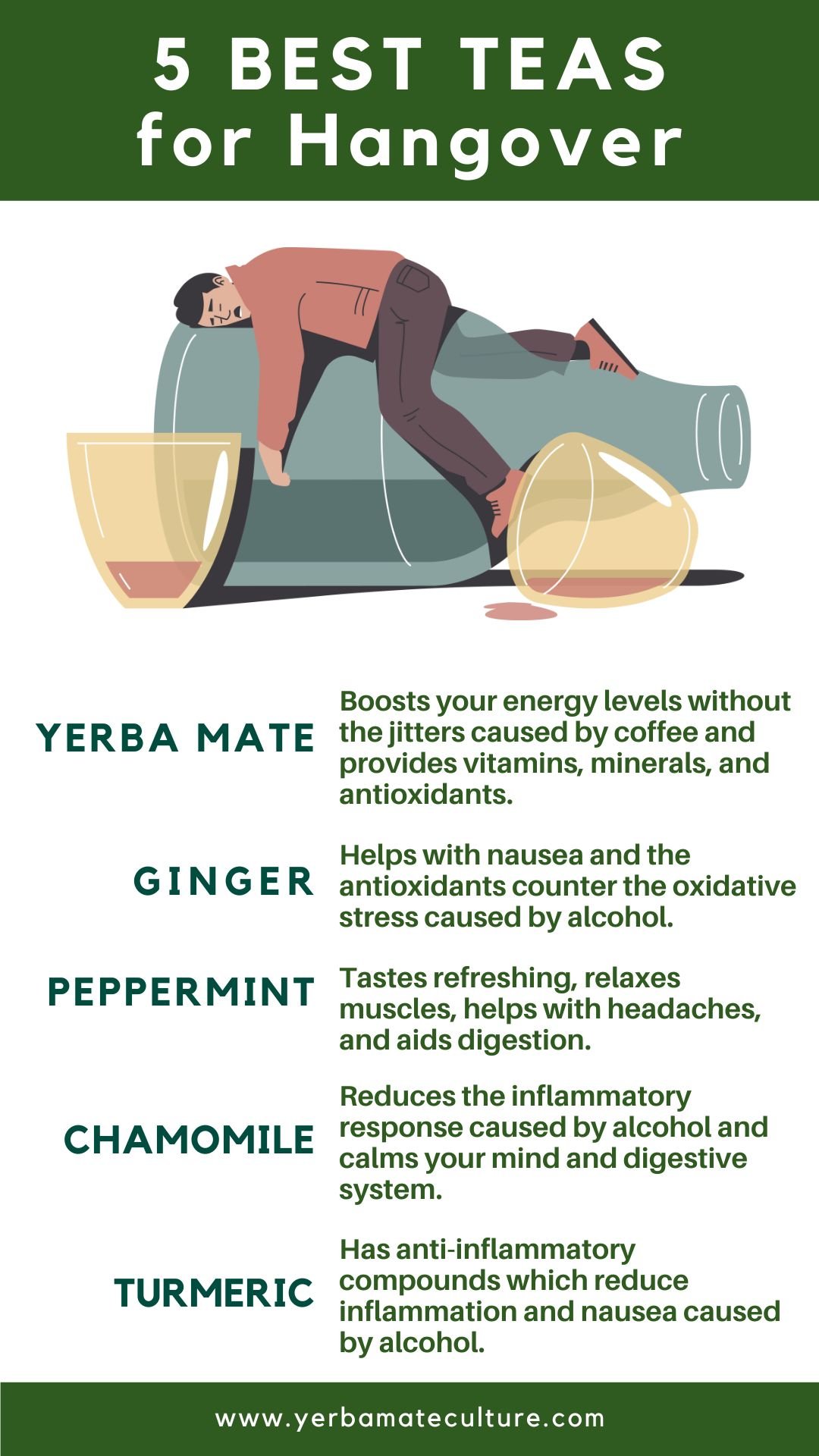
What Causes Hangover?
Of course, a hangover is ultimately caused by ingesting too much ethanol. The way alcohol affects you depends on the type of drink and how much you consume. But how much is too much?
For some people, one alcoholic drink is all it takes to trigger the symptoms.

To understand this unpleasant condition and its symptoms, let’s take a deeper look at what happens in your body when you consume alcohol.
The hangover is an aftereffect of alcohol entering your body, and it usually starts within a few hours after the last drink as your blood alcohol concentration (BAC) drops (withdrawal). Symptoms are usually at their worst at the time your BAC is zero and may continue for up to 24 hours later. Yikes!
Factors that contribute to a hangover include:
- Dehydration: It is easy for your body to lose liquids (dehydrate) during and after drinking. Blame it on the alcohol! You see, alcohol is a diuretic, meaning it causes your body to remove fluids from your blood at a faster than normal rate. This makes you urinate more often, leaving you dehydrated and more prone to feeling hangover symptoms such as excessive thirst, dizziness, and headaches.
- Inflammation: Hangover symptoms are linked to increased inflammation in the body since alcohol seems to trigger the inflammatory response of the immune system. You may have trouble concentrating or remembering things as a result.
- Gastrointestinal effects: Alcohol can speed up or slow down digestion, which may cause you to experience nausea, vomiting, indigestion, or diarrhea. This happens mainly because the ethanol in alcohol irritates the digestive system and increases acid production.
- Electrolyte imbalance: The way alcohol metabolizes or breaks down in the body can result in electrolyte imbalances. Drinking on an empty stomach or after a very heavy meal can impact the metabolic effects of alcohol and make you feel weak, irritable, or dizzy.
- Low blood sugar: Alcohol impairs glucose (sugar) production in the pancreas. This lowers blood sugar and causes symptoms of hypoglycemia such as dizziness, fatigue, and irritability.
- Sleep disturbance: Drinking late at nights or when you’re sleep-deprived can increase the chance of the nasty side-effects of alcohol. Alcohol also contributes to poor sleep quality by affecting brain chemistry and sleep rhythms, as well as blocking REM sleep, which is important for properly restoring your body. Thus, you may feel a lot drowsier the next day.
5 Best Hangover Teas
I hope I have your full attention by now because I’m about to reveal some herbal tea secrets for relieving a hangover. Chances are you have one of these herbs in your kitchen not knowing that it could help ease your symptoms.
1. Yerba Mate
Yerba mate tea is said to be a herbal hangover cure. Is this true and how does it help?
This traditional South American herbal infusion comes from the Ilex paraguariensis plant and the natives use it for treating conditions such as diabetes, high blood pressure, and digestive problems. It’s also a popular remedy for a hangover, and for a good reason!
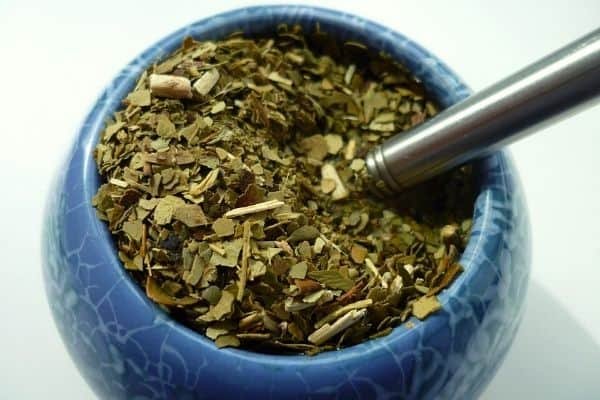
This plant seems to have the health benefits of tea and the strength of coffee. It contains more antioxidants than green tea and plenty of caffeine. In addition to caffeine, yerba mate tea contains 2 other stimulants, theophylline, and theobromine, that help with balancing out the energy boost you get from it.
The herb is also rich in vitamins, minerals, and amino acids, hence the nickname, “the drink of the gods.”
How it Helps
Since it is packed with so many nutrients, it can help rejuvenate the body during a hangover. Just remember that since yerba mate contains caffeine, which is a diuretic, it might be a good idea to first drink something that helps to rehydrate the body.
Drinking the loose-leaf tea or yerba mate energy-drink can increase your energy and alertness, without the jitters caused by coffee.
These claims were tested in a study. The research concluded that yerba mate can, in fact, increase exercise and sports performance because of its positive impact on the body’s metabolism.
How to Make It
I have put together a thorough guide about brewing yerba mate tea.
You might also want to try tereré – iced yerba mate from Paraguay.
Where to Buy It
There are many types of yerba mate products available. To find the best ones, check out these guides:
- 5 Popular Yerba Mate Loose Leaf Brands
- Best Yerba Mate Tea Bags
- Yerba Mate Leaf Extract
- My Favorite Yerba Mate Canned Energy Drinks
2. Ginger Tea
You’ve got to try ginger tea for a hangover and for any other maladies that this herb can help relieve. Ginger (Zingiber officinale) is a widely known herb that has been serving as a spice and natural medicine for centuries.

Ginger is best known for its ability to soothe the digestive tract and relieve hangover symptoms such as nausea and vomiting. Credit it to the antioxidant effects of ginger. Several scientific studies confirm the therapeutic benefits it provides to the gastrointestinal system.
How it Helps
Ginger tea is especially useful for treating nausea related to a hangover. One particular study focused on the use of ginger rhizomes as a treatment for nausea and vomiting related to pregnancy and chemotherapy.
According to the results of this study, ginger is just as effective as medication treatment. In some instances, it was significantly more effective for relieving nausea and vomiting.
Another study labeled zingiber officinale as a “good candidate” for preventing and treating hangovers. The antioxidant compounds present in the herb may help to alleviate the oxidative stress caused by alcohol in the bloodstream.
How to Make It
You can follow my fresh ginger tea recipe to make your own hangover cure.
Where to Buy It
Read my guide on the best ginger tea brands and products.
3. Peppermint Tea
My grandmother is a staunch herbalist, so there is no need to guess why I’m into plant medicine and herbal teas. She brews peppermint tea from the leaves of the plant and drinks it for an upset stomach.
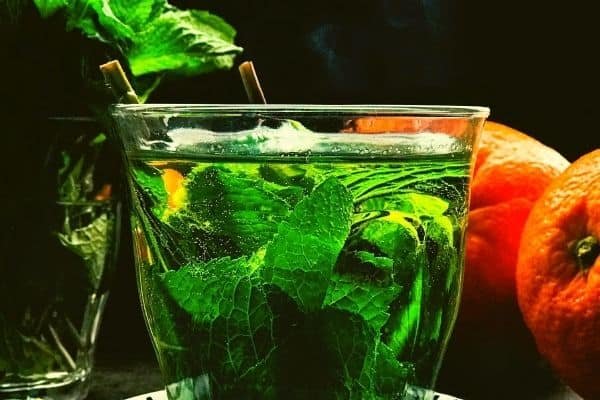
Note that peppermint is generally safe for use but not recommended for people with gastroesophageal reflux disease (GERD).
How it Helps
For all you know, a soothing cup of peppermint tea might do the trick in helping you beat that hangover. You won’t be able to dodge the unique aroma and cooling sensations it is known for.
Several studies support the use of peppermint (Mentha piperita) for indigestion. The plant is a cross between spearmint and peppermint. Its active ingredients menthol and methyl salicylate have antispasmodic effects, which can work to relax the muscles in the gastrointestinal tract.
The herb may also improve the flow of bile, a fluid that aids digestion. This helps food to pass through the stomach faster.
Now you know why people reach for a peppermint candy after dinner. It’s more than just an after-dinner mint. It actually helps reduce muscle spasms associated with indigestion.
How to Make It
You can make mint tea with fresh or dried mint leaves by steeping them in freshly boiled water for 5 to 10 minutes. Then add some lemon juice and honey for the taste!
Or how about making some traditional Moroccan mint tea?
Where to Buy It
I warmly recommend that you take a look at this guide with the best mint teas.
4. Chamomile Tea
The calming effects of delicious chamomile tea and its other potential therapeutic benefits make it one of the best teas for hangover anxiety and other symptoms.
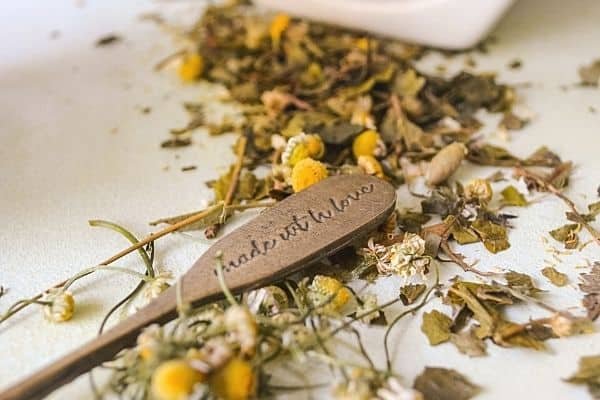
There are two common types of chamomile used for making teas: German chamomile (Matricaria recutita) and Roman chamomile (Anthemis nobilis). Both are traditionally used to treat an upset stomach and calm the nerves. It’s the reason why many people drink chamomile tea before bed.
You are more likely to find German chamomile as tea bags and dietary supplements since more studies were done on its health benefits compared to Roman chamomile. Researchers found that the plant has antioxidant properties to aid digestion and anti-inflammatory properties to regulate immune function.
How it Helps
Putting this in the context of a hangover, chamomile tea may help reduce the inflammatory response alcohol triggers in the body, soothe the digestive system, and help you to relax.
A good cup of chamomile tea may also help keep you calm or prevent hangover-related anxiety. This type of anxiety is short-lived and will go away once you’re “sober” again.
One study tested the anti-anxiety potential of chamomile. The participants of the study, who suffered from generalized anxiety disorder (GAD), were given pharmaceutical-grade chamomile extract as a therapy. The study concluded that the herb significantly reduced anxiety symptoms and is safe for long-term use.
How to Make It
Steep fresh or dried chamomile flowers in hot water for up to 5 minutes.
Where to Buy It
There are many great chamomile tea products available in tea bags, as loose leaf tea, and within different types of herbal blends. You can find my favorite ones here.
5. Turmeric Tea
Turmeric (Curcuma longa), also known as Indian saffron, is a traditional Ayurvedic spice and herb related to the ginger family. The Indians use it traditionally for cooking and as a natural remedy for joint pain, swelling, and other conditions.
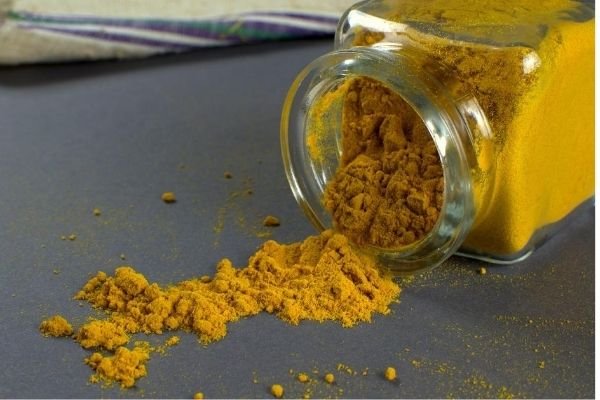
Today, turmeric is popular in many countries and is marketed as a natural dietary supplement for a list of ailments including inflammatory arthritis.
The US Food and Drug Administration (FDA) approves curcumin, labeling it “Generally Recognized As Safe” (GRAS). Clinical trials established it as well-tolerated and safe for human use.
How it Helps
Curcumin, the active ingredient in turmeric, is a natural compound loaded with anti-inflammatory agents. According to research, it may help reduce the production of inflammation caused by alcohol.
There are studies exploring turmeric as an anti-inflammatory drug for the treatment of hangover symptoms. So far, existing evidence suggests that the herb can help relieve ethanol-induced nausea and vomiting because it possesses antioxidant effects similar to ginger.
How to Make It
Make a cup of delicious golden milk turmeric tea to make you feel better. Or maybe just get some organic Buddha Teas Turmeric Ginger Tea Bags for an easy way to cook up a remedy.
Where to Buy It
Find the best turmeric teas in this buyer’s guide.
Bounce Back with These Hangover Tips!
The best way to treat a hangover is to avoid one by not drinking at all. If you are still going out for a few drinks, know your limit!
Unfortunately, it’s just too easy to have a few more drinks than you were planning to. Especially when you are out celebrating your friend’s birthday or house warming.
If the damage is already done, then try some of the herbal teas mentioned in this article. These plants contain powerful therapeutic ingredients that can provide some much-needed relief.
When you do happen to overdrink, one or a few cups of herbal teas throughout the day can re-energize the body and restore balance. Although these herbal teas provide a safe and inexpensive way to bounce back after too much booze, it’s always best to ask your doctor if they are safe for you.
You can also blend these herbs to make an even more powerful herbal beverage. One of my personal favorites is mixing yerba mate, with peppermint, ginger, and adding a dash of lemon juice and maybe a bit of honey as well.
Or how about some refreshing herbal iced tea for a hangover on a hot summer day?
Other ways to avoid hangover symptoms include eating carb-rich foods before drinking, sticking to light-colored drinks, drinking slow, and staying hydrated.
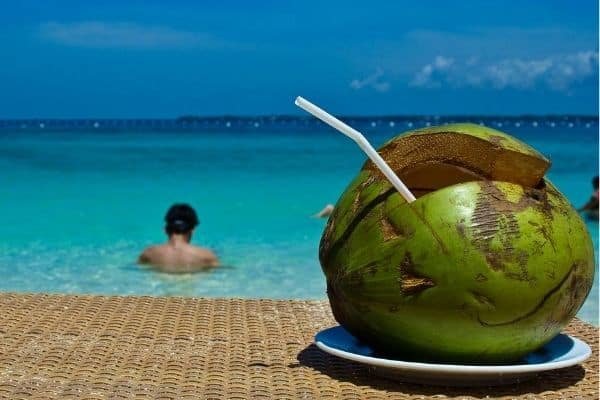
How to Recover from a Hangover?
Finally, here is a complete list of my best tips for treating a hangover:
- Drink some of the herbal teas introduced in this article. Have some ginger or peppermint tea for nausea or digestive issues. Turmeric tea is great for headaches and muscle pain while chamomile eases anxiety.
- When you need an energy boost, have some yerba mate tea. Just don’t drink too much, because caffeine is also a diuretic.
- Drink coconut water (fresh or canned) to rehydrate your body. It contains plenty of electrolytes such as potassium, which are important for restoring your body from the imbalance caused by alcohol consumption.
- Eat something light like chicken soup or maybe just a piece of bread and some fresh fruits. If you don’t feel nauseous then go for a full breakfast.
- If you feel up to it, do some light exercise like walking or jogging in the fresh air. Then take a shower after that, and you will feel like a new person!
Herbal Teas and Hangover FAQ
What is the best herbal tea for hangover?
My personal favorite for a hangover tea is a blend of yerba mate, peppermint, and ginger. I usually prepare it with a French press. This herbal hangover cure tastes refreshing, boosts energy levels, and helps with nausea and digestive problems. If it’s a hot day, you can also make an iced version and add a dash of fresh lemon juice and some honey.
Can yerba mate help with a hangover?
Alcohol disturbs sleep and a hangover often comes with a tired and drained feeling. Yerba mate contains caffeine and other compounds that help with increasing energy levels without the jitters of coffee. When you use yerba mate to treat a hangover, just remember not to drink too much because caffeine is a diuretic and can dehydrate your body.
Is peppermint tea good for a hangover?
Peppermint tea is one of the best hangover cures because it tastes and smells refreshing, can help with a headache, and aids in relaxing muscles and the digestive system.
Should I drink chamomile tea for a hangover?
I can warmly recommend drinking chamomile tea when you are experiencing a morning after. It has a calming effect on your mind and body which helps reduce the anxiety that often comes with a hangover.
I hope you found this article useful.
Please post a comment below and tell me if you tried any of these herbal teas or other tips. Any other experiences related to the topic are also welcome.
Let’s beat that hangover and get back in the game!
-Joonas

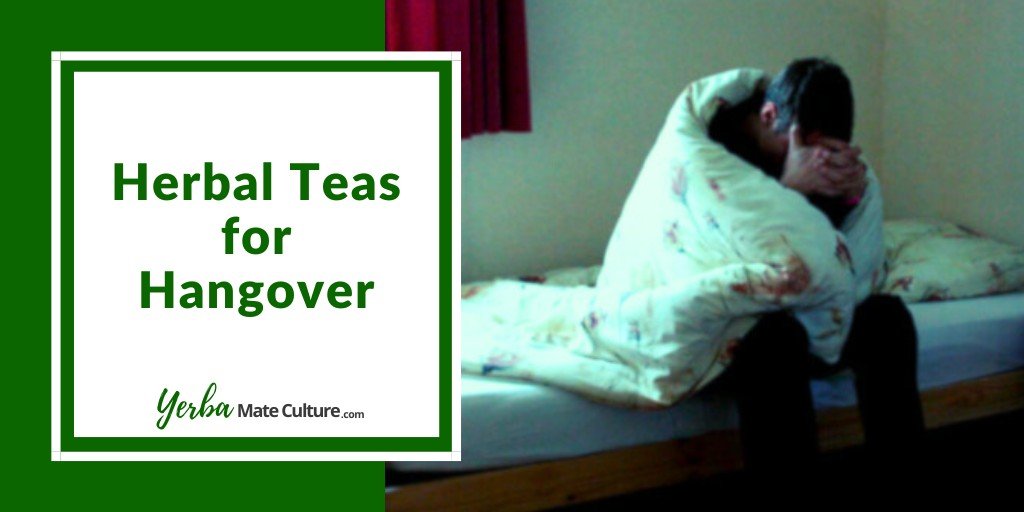
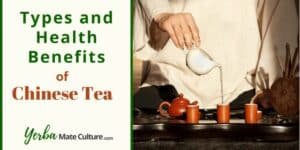

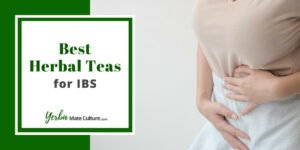
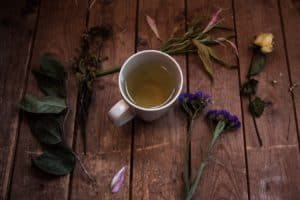
Hi Joonas, thanks so much for your post. I must admit I have been drinking alcohol in the week far more often during lock down (not sure why). I am bored of trying to dose up on tablets and soak it up with fatty foods. Your post has been a huge help. Herbal teas will be on the shopping list for sure.
Hi Russ,
Yeah, I know what you mean. It’s easy to feel a bit bored during the lockdown and have a few beers because of that. I hope my tips will provide some relief for your future hangovers!
-Joonas
I must say I’m aware of most of these teas apart from the yerba mate tea. Which I have made a note to come back to. I love the rest of the teas you’ve recommended here for a hangover. Ginger tea and peppermint tea is my most favorite. I am not an alcohol drinker, but as a child, I used to be travel sick and ginger and peppermint use to help me so much, so I highly recommend to give this natural infusion a go. I’m sure you won’t be disappointed.
Many thanks for sharing these natural tea ideas with us.
Hi Habib,
If I don’t sleep well, I sometimes feel like having a hangover even I didn’t drink any alcohol. So these tips can be used for general wellbeing also.
A blend of ginger, peppermint, and yerba mate is one of my favorite drinks! It’s also great as iced tea.
-Joonas
Joonas,
I really enjoyed your hangover tips. Unfortunately, I am prone to getting hangovers very easily in my older years, so I’m happy to know that there are some remedies.
I do find that the more sugars alcohol contains, the more hungover I feel – why is that?
Thanks for this information! I’m glad to know there are other things out there besides just Pedialyte that I’ve been using to help cure my terrible headaches after drinking ONE SUGARY DRINK! 🙂
Katrina
Hi Katrina,
Great to hear that you found my tips useful.
Many theories exist as to why sugary alcoholic drinks could cause a worse hangover, but there is no real evidence to confirm any. I think it might have something to do with the fact that both alcohol and sugar are processed through the liver.
Hopefully, you won’t get bad hangovers anymore, but if you do, I hope my tips will help!
Best Regards,
Joonas